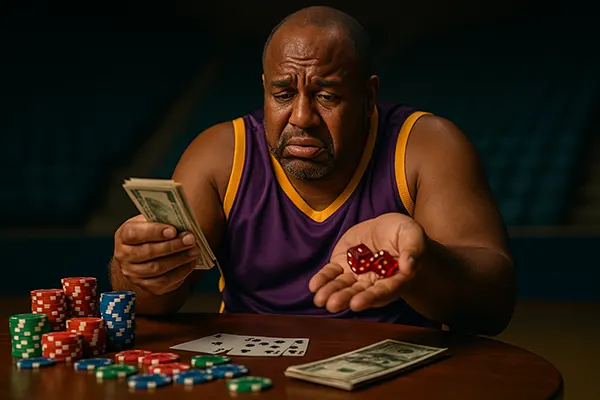Success in professional sports often brings fame, fortune, and an intense pressure to maintain peak performance. For some athletes, this pressure — combined with sudden wealth and lifestyle changes — becomes fertile ground for risky behaviours like gambling. This article examines true stories of internationally known athletes whose promising careers took a devastating turn due to compulsive gambling habits.
Famous Careers Destroyed by Gambling Addiction
Gambling addiction doesn’t discriminate — it can affect athletes across all disciplines, regardless of their fame or income. Paul Merson, a former Arsenal and England footballer, is one of the most publicised cases. In the 1990s, Merson admitted to severe addictions not only to gambling, but also to alcohol and cocaine. He lost millions of pounds and nearly destroyed his career and personal life before entering rehabilitation and speaking openly about his struggles.
Another high-profile example is Charles Barkley, the NBA legend. Barkley has publicly estimated his gambling losses to be around $10 million over his career. Though he continues to be financially stable, his experience underlines how even the most successful professionals can be drawn into destructive betting behaviours.
In the world of cricket, Chris Cairns, the former New Zealand captain, was embroiled in match-fixing allegations that had gambling undertones. Though he denied wrongdoing and was acquitted in court, the scandal overshadowed his legacy and highlighted the intersection of gambling and ethical breaches in sport.
The Psychological Toll Behind the Headlines
Beyond the financial loss, gambling addiction brings deep emotional and psychological consequences. Many athletes develop a gambling habit as a coping mechanism for stress, injuries, or post-retirement identity crises. The thrill of betting replicates the high of competition, making it dangerously appealing for those used to performing under pressure.
For Merson, gambling became a substitute for emotional voids, worsening his mental health. He later described experiencing suicidal thoughts during the height of his addiction. This highlights the urgent need for psychological support tailored specifically for athletes, especially those transitioning out of professional sport.
The lack of mental health resources in competitive environments often leads athletes to suffer in silence. Gambling addiction is typically hidden until it becomes unmanageable, and by that point, the damage — reputational, financial, and emotional — can be irreversible.
Financial Collapse and Legal Repercussions
Some athletes not only lost their fortunes but also faced legal consequences. Evander Kane, the NHL star, filed for bankruptcy in 2021 after amassing debts exceeding $26 million, including large sums reportedly tied to gambling. His career continued, but the fallout deeply affected his public image and sponsorship prospects.
Former baseball player Pete Rose holds a unique position in this context. Despite holding the record for the most career hits in Major League Baseball, Rose was permanently banned from the sport for betting on games while managing the Cincinnati Reds. His exclusion from the Hall of Fame remains controversial, but it’s a direct consequence of his gambling behaviour.
These cases demonstrate that gambling-related fallout isn’t confined to personal suffering — it can have lasting professional and legal consequences. For some, the stigma of scandal remains long after their playing days end.
The Role of Sports Institutions
Sports leagues and organisations have begun acknowledging the problem by implementing education and intervention programmes. However, critics argue that these initiatives often lack depth and are introduced only after public scandals. Preventative education, particularly aimed at young and up-and-coming athletes, remains limited in scope and effectiveness.
Moreover, the growing relationship between sports and the gambling industry — including sponsorships and betting ads — complicates the matter. Athletes are frequently caught between professional responsibilities and an environment that normalises betting. This contradiction weakens the overall message against gambling harm.
To be effective, institutions must prioritise long-term support systems, not just policy statements. Anonymous counselling, financial advisory services, and strict betting prohibitions are steps in the right direction — but enforcement remains key.

Rebuilding Lives After Hitting Rock Bottom
Despite the devastation, several athletes have successfully rebuilt their lives. Paul Merson now works as a pundit and actively promotes mental health awareness. His autobiography and interviews have been widely praised for their honesty and vulnerability. His story offers hope to those still struggling in silence.
Michael Chopra, a former Premier League striker, has also spoken out about his gambling addiction, which reportedly involved betting up to £20,000 daily. After seeking help, he became involved in awareness campaigns and encouraged football clubs to take more responsibility in addressing the issue among their players.
These stories show that with the right support, recovery is possible. Many ex-athletes are now using their platforms to help others avoid the same mistakes, breaking the stigma around addiction and encouraging open dialogue within the sports community.
Lessons for Future Generations
The tragedies and recoveries of these athletes offer vital lessons. First, sports bodies must improve preventative education and provide year-round access to psychological support. Second, there should be greater transparency around betting partnerships and more robust safeguarding policies for players.
For aspiring athletes, these stories serve as a warning: fame and wealth can vanish in an instant if risky behaviours are left unchecked. Financial literacy and mental health support should be seen as crucial aspects of any athlete’s training and career development.
Finally, society must change how it views gambling addiction — not as a moral failure but as a mental health issue requiring compassion and structured help. Only then can we hope to prevent the next generation of stars from facing similar downfalls.
